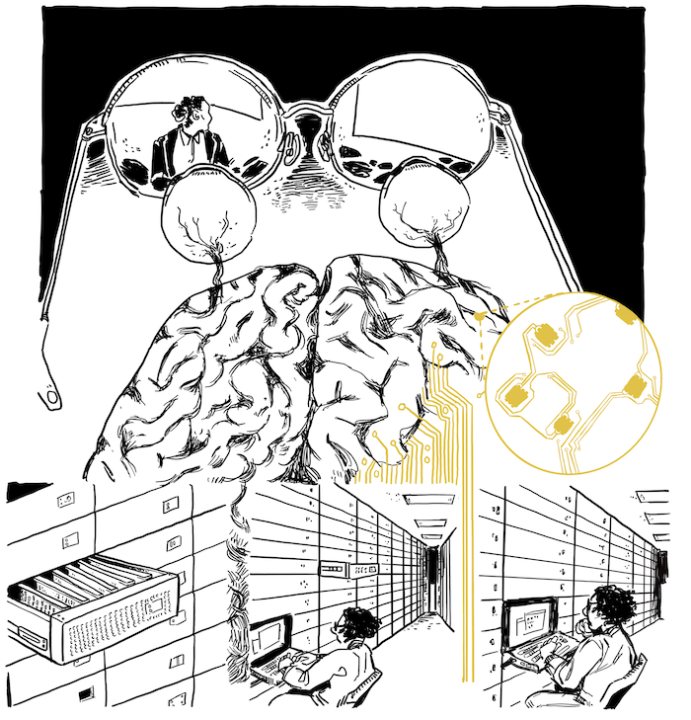The Institute of Neuroscience (ION) is a group of biologists, psychologists, mathematicians, and human physiologists at the University of Oregon that has pooled its expertise to tackle fundamental questions in neuroscience – questions such as:
- How do neural circuits produce behavior?
- What can computational approaches tell us about how the brain operates?
- How do neural stem cells choose between self-renewal and differentiation?
- What mechanisms generate the large diversity of neurons within the brain?
- How do these neurons 'wire up' into functional circuits?
- What are the circuits of reward, addiction, memory, and cognitive flexibility?

Interdepartmental Neuroscience Graduate Program
The Interdepartmental Neuroscience Graduate Program (INGP) strives to help students think independently, creatively, and critically about problems in neuroscience.

Research News
Angelique Allen wins "People's Choice Award" from The Science Coalition for her Fund It Forward Video Challenge Entry. You can watch her award-winning video on The Science Coalition's YouTube channel.
Judith Eisen is elected to the National Academy of Science! University of Oregon neuroscientist Judith Eisen has been elected to the National Academy of Sciences in recognition of her work on neuron development and how the enteric nervous system in the gut regulates and interacts with microbes in the intestine. Congratulations to Judith!
Judith Eisen was awarded the George Steisinger Award from the International Zebrafish Society. This award recognizes Dr. Eisen's long track record of pioneering research in developmental neurobiology and her innovative ongoing research program to understand host-microbe interactions and their impact on the nervous system.
Emily Sylwestrak is awarded a Klingenstein-Simons Fellowship Award in Neuroscience. "The Klingenstein-Simons award gives recognition to outstanding scientists who have made valuable contributions in their early research efforts, and who show the greatest promise for a successful research career."
The McCormick and Berkman Labs receive a competitive grant from the Tiny Blue Dot Foundation to examine the neural and psychological effects of undergraduate course instruction in positive life engagement.
The Miller Lab reveals the role of important proteins in control of electrical synapses. Learn more in Oregon News and Current Biology.
The Lockery Lab asks the question, "Do C. elegans get the munchies too?" Learn more in Nature, and Current Biology
"UO neuroscientists look deep into the eyes of the octopus" features work by the Cris Niell Lab in Oregon News.
Chuck Kimmel is elected to the National Academy! Charles Kimmel is responsible for establishing the zebrafish (Danio rerio) as a standard laboratory model organism that is used prominently in academic laboratories and industries around the world to study the genetic mechanisms underlying vertebrate development and function, including human diseases. His research and mentorship of legions of colleagues and gifted young scientists resulted in a fundamental transformation in the biological sciences, the importance of which cannot be overstated.
"Researchers predict rat behaviors from brain activity" features our recent article published in Neuron by the Mazzucato lab in Oregon News.
Collaboration
ION boasts a highly collaborative faculty with expertise in genetics, development, electrophysiology, optogenetics, functional imaging, computational modeling, and theory. As a result, students enrolled in our PhD program come away with the broad conceptual and technical skills necessary to be an independent and successful scientist. Our state-of-the-art facilities and excellent support staff allow ION members to progress rapidly from exploratory and pilot experiments to rigorous testing of novel hypotheses.

Community
We're passionate about creating a welcoming community of scientific investigators and scholastic teachers who work to ensure that all members are valued and supported. Together we can achieve much more than we can as individuals, and all of us can make valuable and important contributions to the research and teaching mission.
New Undergraduate Major in Neuroscience
A longstanding area of research excellence and a popular new major, neuroscience takes center stage at the University of Oregon
Trainee Awards

Angelique Allen - Graduate Student

Kana Suzuki - Graduate Student

Kelsey Schultz - Graduate Student

Shelby Sharpe - Graduate Student

Nayantara Arora - Undergraduate Student

Alexa Wright - Undergraduate

Amanda Welch - Graduate Student





























